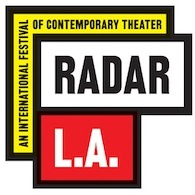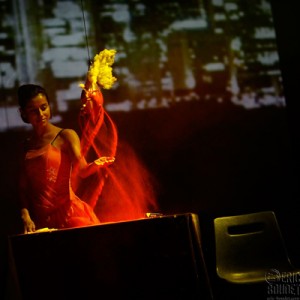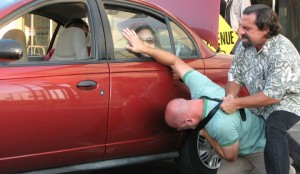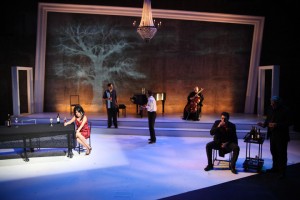
TEATRO LINEA DE SOMBRA: AMARILLO
In the mixed-media event par excellence of RADAR L.A., Amarillo is perhaps the most spectacular of the international events that are giving intellectually curious and eager Los Angeles theater audiences a special frisson of excitement this week. But it doesn’t stop at being visually arresting and aurally hypnotic; it builds up to a devastating and politically potent commentary on the thousands of nameless dead bodies that attempt to cross the U.S./Mexico border and make it, but, in harsh reality, never really do make it. The text by Gabriel Contreras, which includes the translation of a poem by Harold Pinter, is a poetic distillation of the facts, turning its John Doe into Everyman and ultimately into every victim of this endless nightmare of displaced people in search of freedom.  But it is the lighting design and the digital programming by Kay Pérez which gives the text its shape and illuminates its intricate coding. Even as we watch the performers putting everything in place, allowing us to see the process as we experience the drama, the results are mesmerizing. Raúl Mendoza, the actor at the center of this unfolding spectacle of ideas, is the essence of high-voltage energy, and, in one unsettling moment, breaks out of the piece to declare in un-subtitled Spanish his personal involvement, something we didn’t really need to be reminded of, since commitment and passion would, of necessity, be at the heart of such a rich theatrical brew. But, in the end, it is Jesus Cuevas and his extraordinary voice – a rich counterpoint to Rodrigo Espinosa’s gut-kicking sound design – who provides Amarillo with its most haunting moments. Its director, Jorge A. Vargas, is clearly one of the most significant discoveries of this unique and essential festival.
But it is the lighting design and the digital programming by Kay Pérez which gives the text its shape and illuminates its intricate coding. Even as we watch the performers putting everything in place, allowing us to see the process as we experience the drama, the results are mesmerizing. Raúl Mendoza, the actor at the center of this unfolding spectacle of ideas, is the essence of high-voltage energy, and, in one unsettling moment, breaks out of the piece to declare in un-subtitled Spanish his personal involvement, something we didn’t really need to be reminded of, since commitment and passion would, of necessity, be at the heart of such a rich theatrical brew. But, in the end, it is Jesus Cuevas and his extraordinary voice – a rich counterpoint to Rodrigo Espinosa’s gut-kicking sound design – who provides Amarillo with its most haunting moments. Its director, Jorge A. Vargas, is clearly one of the most significant discoveries of this unique and essential festival.
(at the REDCAT; ends June 19)
MOVING ARTS: THE CAR PLAYS
 When one is waiting in line for The Car Plays, one feels as if it is an amusement ride we are waiting to get on, as opposed to seeing another theater event. And, of course, that is precisely what we are doing. This is perhaps the fun event of the week, sitting in the back seat of five different cars, watching a marvelous group of actors in five ten-minute “car” plays that vary in quality, but which are almost all riveting. How can one not be riveted being in such intimate circumstances? And any false note from an actor would be uncomfortably jarring; there was nary a one. Although I must admit I was somewhat put off by the tour guide’s comic observations as we were being led to our destination, it didn’t in any way affect the good time that was had once we entered the back seats of the cars waiting for us. The plays were primarily neat little forays into character, human vignettes that could be searing (Paul Stein’s “Disneyland”) or sexy (JJ Strong’s “The Love of Make-Believe”) or provocative (Ron Klier’s “Am I Losin’”) or funny/odd (Jami Brandli’s “Flooding”), and, what they lacked in depth, they made up for in the intensity of their communication. Once off the ride, one felt ready to wait in line for another. It was pleasurable seeing RADAR L.A. offer up an amusement ride among its varied and many gifts.
When one is waiting in line for The Car Plays, one feels as if it is an amusement ride we are waiting to get on, as opposed to seeing another theater event. And, of course, that is precisely what we are doing. This is perhaps the fun event of the week, sitting in the back seat of five different cars, watching a marvelous group of actors in five ten-minute “car” plays that vary in quality, but which are almost all riveting. How can one not be riveted being in such intimate circumstances? And any false note from an actor would be uncomfortably jarring; there was nary a one. Although I must admit I was somewhat put off by the tour guide’s comic observations as we were being led to our destination, it didn’t in any way affect the good time that was had once we entered the back seats of the cars waiting for us. The plays were primarily neat little forays into character, human vignettes that could be searing (Paul Stein’s “Disneyland”) or sexy (JJ Strong’s “The Love of Make-Believe”) or provocative (Ron Klier’s “Am I Losin’”) or funny/odd (Jami Brandli’s “Flooding”), and, what they lacked in depth, they made up for in the intensity of their communication. Once off the ride, one felt ready to wait in line for another. It was pleasurable seeing RADAR L.A. offer up an amusement ride among its varied and many gifts.
(at the REDCAT; ends June 18)
LATINO THEATER COMPANY: SOLITUDE
 Solitude is an act of love, but an act performed by an almost too zealous lover. José Luis Valenzuela has directed as if he has received a gift from the gods; he has staged the play within an inch of its life, bringing to the Evelina Fernández play an enchanting musicality and a sense of style that is often exquisite (almost self-consciously so), without ever letting go of the throbbing emotionalism that the play opens itself to shamelessly. And, even when things turn melodramatic, Valenzuela suffuses the atmosphere with carefully crafted moments of dry wit. The musicality is enhanced by the glorious cello-playing of Semyon Kobialka, whose elegant music punctuates John Zalewski’s sensational sound design. And it takes place on François-Pierre Couture’s ravishing set which Couture has lit to perfection as it shifts from mood to mood, and he is aided immeasurably by Christopher Ash’s skillfully designed projections, which introduce the title of each new scene. And the actors – ah, the actors; what a mostly marvelous cast has been assembled – bring to every moment a palpable warmth that gives way to intense heat as the play moves forward. One is not apt to quickly forget the seasoned suavity of Robert Beltran who understands Octavio Paz but understands even better how to bring sensual love to lonely women. And the bitterly ill-used wife as portrayed luminously by Lucy Rodriguez tells us so much more interesting things about the character than the play itself reveals. Playwrights are not necessarily the best interpreters of their own work, but, on the basis of her work here, Ms. Fernández is, if anything, an even better actor than she is a playwright. Sal López is so thoroughly convincing as a working-class Joe that he doesn’t seem to be acting at all and, when he sings, he is so moving that the audience stands at attention. And when the ensemble stands before us, arms raised, they are like toreadors, after the kill, proudly demanding cheers from the roaring crowd.
Solitude is an act of love, but an act performed by an almost too zealous lover. José Luis Valenzuela has directed as if he has received a gift from the gods; he has staged the play within an inch of its life, bringing to the Evelina Fernández play an enchanting musicality and a sense of style that is often exquisite (almost self-consciously so), without ever letting go of the throbbing emotionalism that the play opens itself to shamelessly. And, even when things turn melodramatic, Valenzuela suffuses the atmosphere with carefully crafted moments of dry wit. The musicality is enhanced by the glorious cello-playing of Semyon Kobialka, whose elegant music punctuates John Zalewski’s sensational sound design. And it takes place on François-Pierre Couture’s ravishing set which Couture has lit to perfection as it shifts from mood to mood, and he is aided immeasurably by Christopher Ash’s skillfully designed projections, which introduce the title of each new scene. And the actors – ah, the actors; what a mostly marvelous cast has been assembled – bring to every moment a palpable warmth that gives way to intense heat as the play moves forward. One is not apt to quickly forget the seasoned suavity of Robert Beltran who understands Octavio Paz but understands even better how to bring sensual love to lonely women. And the bitterly ill-used wife as portrayed luminously by Lucy Rodriguez tells us so much more interesting things about the character than the play itself reveals. Playwrights are not necessarily the best interpreters of their own work, but, on the basis of her work here, Ms. Fernández is, if anything, an even better actor than she is a playwright. Sal López is so thoroughly convincing as a working-class Joe that he doesn’t seem to be acting at all and, when he sings, he is so moving that the audience stands at attention. And when the ensemble stands before us, arms raised, they are like toreadors, after the kill, proudly demanding cheers from the roaring crowd.
But then, alas, there’s the play. It’s got something going for itself, but it just doesn’t recognize its own clichés. Overwritten and full of woozy philosophizing, it reduces the ideas and thoughts of Octavio Paz, whose The Labyrinth of Solitude inspired the writing of the play, to sentiment-laden pieties, and the plot it concocts – a reunion of old friends who have gathered at the funeral of the mother of the play’s central character – veers into soap opera, the kind where the more people drink the more they seem ready and willing to reveal not only truths about themselves but the real feelings they have toward one another. And the ending – which strives for a passionate statement about the betrayal of one’s roots and the revolutionary spirit that informs those who stay true to them – seems tacked on. But, because it is so well-done and so beautiful to look at, it maintains real power even after it has at least one anti-climax too many. Solitude, as a play, needs work. The production more than justifies its existence.
(at Los Angeles Theater Center; ends June 18)
harveyperr @ stageandcinema.com
for tickets, visit http://www.redcat.org/event/radar-la-festival